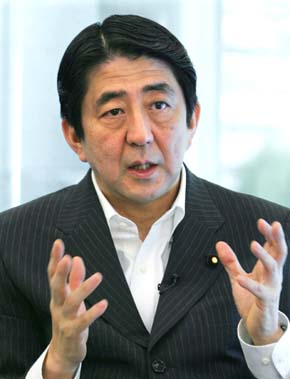 |
Japan’s likely leader rebuffs repentant position
Japan’s Chief Cabinet Secretary Abe Shinzo, whose ascension as the nation’s next prime minister is all but certain, has stirred up controversy by indicating he would not maintain the government’s official repentant position over its past atrocities. In a speech to mark the 50th anniversary of Japan’s defeat in WWII, then-prime minister Murayama Tomiichi said, "Through its colonial rule and aggression, Japan caused tremendous damage and suffering to the people of many countries, particularly to those of Asian nations." Since then, Japanese leaders have essentially rendered his speech the government’s official position; current Prime Minister Koizumi Junichiro has said to parliament that he shares Murayama’s view.But when asked if he would accept the government’s official position, Abe on September 6 said, "It was an historic speech by the Japanese government," adding, "the next prime minister should express his views on Japan’s activities during the war years." His remarks seemed to mean that he would not endorse the Murayama statement. When his remarks began to create controversy, Abe pulled back somewhat, saying at a press conference on the same day that he "will not have to issue a statement stating a new position." But when asked the same question later that day, Abe merely said, "The interpretation of Japan’s war activities should be left to historians." The next day, Abe tried to quell the controversy, saying, "I think Japan became a democratic nation through its frank apologies for causing tremendous suffering and leaving deep wounds to many countries." Abe neither denied the Murayama statement nor mentioned whether he had since reflected on his words and had a mind to offer an apology of sorts. The Asahi Shimbun, a more liberal-leaning Japanese newspaper, noted that Abe is employing an ’ambiguous strategy’ in his approach to history, just as in the problem of Yasukuni Shrine, a memorial to Japanese war dead that Abe and Prime Minister Koizumi frequently visit. He has expressed a sense of incompatibility with the Murayama speech and the former Japanese prime ministers who have repeatedly made apologies based on it, added the newspaper. In 1995, Abe refused to present at Japanese parliament when it had adopted a resolution expressing a deep reflection on the nation’s past. "In terms of awareness of history," said Tokyo University professor Haruki Wada, "whether or not to maintain the Murayama statement is a far more essential problem than whether or not to worship at Yasukuni Shrine."





